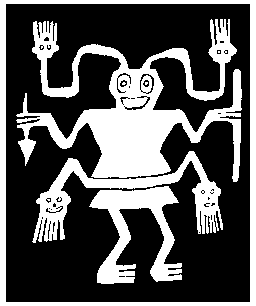Translation
Umberto Eco
Translated by
Alastair McEwen
(University of Toronto)

For instance, this is what he writes about "Translation and Interpretation:"
For Hjelmslev, given the same sonic continuum, two languages A and B segment it differently, producing two different forms of the expression. Once the form of the expression has shaped the continuum, which, prior to that moment was an amorphous possibility, the continuum is formed, and it is that form that interests linguists. In terms of systems, the linguist considers only relations between forms.
Oh well. Once, when I was in Canada for a conference, it being Canada, all our presentations were duly translated into French. One of our party, a broadcast jokester, started out his presentation by saying "Hello." This was translated into French. He then said, "Everything I say is being translated." She translated that into French. He said, "I wonder what it's like being a translator who changes words from English to French?" That was translated. He then said, "I'd like to ask our translator to tell us her name." She translated (without the name). "She must be shy," he said. That was translated. "I would like her to come out, so we can meet her." Dutifully translated.
What Jeff was doing was playing with the form. A translator is theoretically a cog, part of the necessary machinery of getting words simply from one language into another. By addressing her directly (and she translating everything he said to her into French as if he were not addressing her, but the audience), he was creating a double game --- one of translation and translators.
And then there is Javier Marías. In A Heart So White, his leading character works as a translator. At one point, he is working as such at a one-on-one meeting between Margaret Thatcher and a "high ranking politician" of Spain.
Early on, he finds that the communication between the two is nothing but twaddle, so when the politician says, in Spanish, "Would you like me to order you some tea?" our translator changes it to, "Tell me, do the people in your country love you?"...
"I often wonder the same thing myself," she said, and for the first time she crossed her legs, forgetting about her sensible skirt and revealing two very square, white knees. "The people vote for one, indeed they do so more than once. One is elected, again more than once. And yet it's odd, one still doesn't have the feeling of being loved."
I translated this very precisely, only leaving out part of the first phrase in my Spanish version so that he words would appear to our high-ranking politician to be the product of some spontaneous thoughts which, it must be said, seemed to please him as a subject of conversation, since he looked at the woman with very little surprise and a great deal more sympathy and replied, gaily jingling his many keys:
"You're quite right. Votes don't give you any reassurance on that score, however much we need them. Do you know what I think? I think that dictators, rulers in countries where there are no democratic elections, are more loved than we are. And more hated too, of course, but they're still more intensely loved by those who do love them, whose numbers, moreover, are always on the increase."
I considered that this final was a little exaggerated, not to say inaccurate, so I translated everything except that phrase (I omitted it, in short, censored it)...
What has happened here is that the translator has become more than a part of the machinery of international politics; he has become a participant, especially with the following:
I duly translated everything the woman had said except for her final mention of war (I didn't want our politician to get any ideas), and in their place I put the following plea in her mouth:
"Would you mind very much putting away those keys? I'm terribly sensitive to noise lately. I'd be so grateful..."
So once our politician had apologized, blushing slightly, and returned the large bunch of keys to his jacket pocket (they must have been making a hole in it they were so heavy), I decided to betray him yet again, for he said:
"But, naturally, if we do something well nobody organizes a demonstration to show us how pleased they are."
I decided on the contrary to lead him into more personal territory, which seemed to me no less dangerous and also more interesting, and I made him say in crystal-clear English:
"If you don't mind my asking and you don't think I'm being too personal, have you, in your own experience of love, ever obliged anyone to love you?"
Well, talking to all those Semoiticians, alas, Umberto Eco does not deal with the translator comically becoming part of the very process --- leaving his or her prescribed role and emerging as a key element in the action. I hasten to add that I forgive Eco his necessary tedium: when not writing scintillating novels, semiotics is his job --- rattling on about "systems" and "continuums" and "amorphous possibilities."
Despite the formality of it, there are a couple of passages that are a delight, the Eco of old rising to the occasion,. One is a short treatise on the word "Buongiorno" --- how to translate it; the second being a discussion of the beginning of Baudelaire's poem "Les chats." Both are charming, and show us that the master can, when he wishes, be phatic, if not holophrastic.